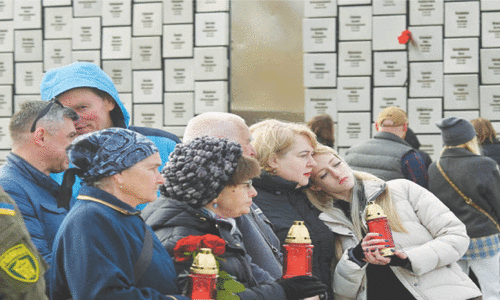THIS is a word that for decades, since soon after the country’s birth, has not figured in the lexicon of any of our ‘great’ leaders.
It is a word and subject that has been wilfully ignored over the formative years and its shunning by successive governments and the miserable funding allocated to it has settled in as a firm and maintained policy.
The sole and truly great leader Pakistan has had was its maker and founder — and that was more than 60 years ago. Since then, all who have followed have not even been mediocre which might have rendered them harmless — they have been either sharp cookies who have undermined the nation by their deeds or dolts or on occasion they have been helpless.
Whatever, a sorry state of affairs which today seems irredeemable as the horizon, as far as the rise and shining of any political figure to come to our rescue, is blank.
In 1947, Mohammad Ali Jinnah realised that his country would need education were it to sustain itself, move forward and progress. It was very much on his agenda and he acted.
Within a few months of the country’s birth he summoned all the communal leaders and addressed them on the subject of their schools — meaning those that had schools specifically for their own community’s children. As far as the Parsis were concerned, the BVS Boys’ School and the Mama Parsi Girls’ School were restricted to children of our community. Jinnah told them that the children of those who were coming to Pakistan from India would need education and requested that the communities open up their schools to children of all creeds and sects. They unanimously agreed.
But it was downhill from thence on. No government in memory has taken on mass education, because it has never had the will. Education and the feudal mindset — the national mindset — do not sit together. The education portfolio has never been popular, rarely sought after.
An old story has it that during the first decade or so of the country’s life after one of its prime ministers who assumed he had completed the dishing out of his cabinet portfolios was reminded by an aide, after all the candidates had departed, that he had not allocated education. The aide was swiftly dispatched to the neighbouring hostel where the aspiring parliamentarians were housed and asked to find someone, anyone, who would be willing to take up the education portfolio.
In the early days there was little if any money to be made out of education but things have changed and after the nationalisation of schools it has become a lucrative business with much to gain when dealing with the appointment of teachers and other staff.
However, as pointed out by Zubeida Mustafa in her informative column printed on the opposite page on March 30 (‘Ringing the alarm bells’), realisation has dawned on “some in the government” that as far as education is concerned Pakistan is a disaster zone — 25 million children do not go to school. This is a staggering figure, bearing in mind that demographic statistics tell us that the majority of the population of 180 million is of school-/college-going age.
The government-established the Pakistan Education Task Force has recently brought out a report entitled Education Emergency Pakistan which has revealed to us the truly deplorable state of Pakistan’s education system. We learn that some 10 per cent of the world’s primary school-age children who are out of school exist in this republic — democratic in name —and in the global ranking of non-school-going children we come in at a disgraceful second place.
The report is a terrible indictment of what constitutes the elite of this maggot-ridden country: countrywide universal education to the age of 16 is unlikely to be achieved within our lifetime. Punjab ‘may’ achieve its universal education in 2041, Sindh in 2049, Khyber Pakhtunkhwa in 2064 and miserably neglected Balochistan in 2100. Are these not thoroughly shaming figures?
As for women, it has never been acknowledged that it is mothers who bring about the education of their children — ignorant illiterate mothers are far more likely to produce equally ignorant and illiterate children than are the few lucky educated ones. Less than half the womenfolk of Pakistan have had any formal education and in the rural areas only one in three women has ever attended school.
Apart from the sheer shame of the figures cited there is danger in this gross and willful neglect. Easily available fodder for the militants amongst us comes from the 25 million youths who have no schools to go to — recruiting foot-soldiers to be brainwashed presents no problems. This should be one prime mover to spur on our government to allocate to education more than the paltry less-than 1.5 per cent of the GDP — which is unbelievably less than the subsidies given to PIA, Pakistan Steel, and PEPCO.
This March 25 the World Bank approved a loan of $400m for education — $300m for university level projects and $50m each for primary school levels in Punjab and Sindh. Fine, but this is not going to get anyone very far as not all of the funds will get to where they are supposed to go — that would be an impossibility in this democratic land.
Our leadership will not, but it should one day, conclude, as did Lee Kuan Yew when he was building Singapore, “that the decisive factors were the people, their natural abilities, education and training. Knowledge and possession of technology were vital for the creation of wealth”. Pakistan needs more than just wealth, much more. arfc@cyber.net.pk










































